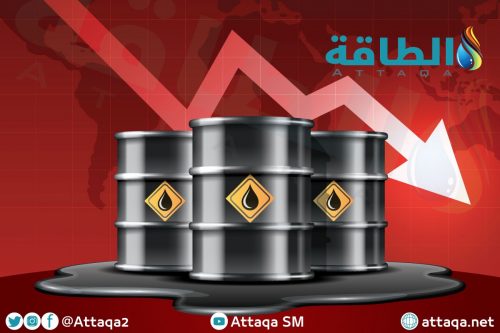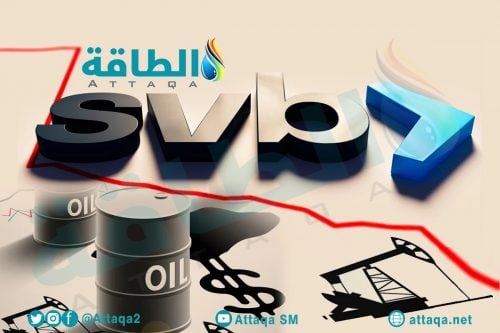Energy platform editorial advisor, energy economics expert Dr. Anas Al-Hajji, said that oil prices collapsed with the collapse of Silicon Valley and Signature banks in the United States.
This came during a new episode of the program “Energy humanitiesPresented by Dr. Anas Al-Hajji on Twitter, entitled “The Effects of the Saudi-Iranian Agreement on Energy Markets…and the Impact of the Collapse of the American SVB Bank on Renewable Energy Investments.”
Al-Hajji added that some do not agree with the description of a “collapse” of what happened, but oil prices have now reached about $75 a barrel, meaning that what clearly happened is a drop in prices of about $10 in about 10 days.
He explained that one of the main reasons for the collapse of oil prices – of course – is the Silicon Valley Bank crisis, which created great fear of a global financial crisis, which may lead to an economic recession, which in turn leads to a decrease in the demand for oil, and thus a decline in prices.
Are oil prices falling?
Anas Al-Hajji, editorial advisor for the energy platform, said that the fear of a further decline in oil prices is limited now.
Thus – according to Al-Hajji – it takes about two days for the markets to realize the size of these fears, to see if prices will rise again this week, or if they will continue to decline, which means that the problem is much greater than we imagine.
Al-Hajji explained that the assurances of the US Treasury must be dealt with with great caution. The problem is that the current Treasury Secretary has many problems, as she has spent a large part of her time on the issue of the Russian oil price ceiling, and has ignored what is happening inside the United States in terms of financial and banking crises.
He added, “With regard to Silicon Valley Bank, for those who want to learn more, China and Israel are involved in it with very large stakes, and it has great effects on renewable energy issues, because it supports companies developing renewable energy on the one hand, and supports emerging new technologies.”
Al-Hajji pointed out that the Silicon Valley Bank allocated 5 billion dollars to spend on renewable energy, and all of this has now evaporated, and of course there are large sums provided to various renewable energy and technology companies as well, all of which will be affected and lead to shrinkage and layoffs of workers in this field.
Dr. Anas Al-Hajji stressed that this downturn and layoffs of workers in the field could constitute a strong blow to US President Joe Biden’s project related to renewable energy, adding: “But the problem we are facing now is that even if the impact is weak, the decline in investments means the need to find an alternative.”
Does the OPEC + alliance intervene?
Dr. Anas Al-Hajji, editorial advisor for the specialized energy platform, said that many have wondered about the possibility of the OPEC+ coalition or the OPEC organization intervening to save the oil markets, after prices fell to $75.
He added, “I do not think that there will be any intervention according to the current prices, but there may be an intervention if prices fall to sixty, and of course one of the reasons that may have played a major role in non-intervention when prices fell to eighty is the continuous rise in the dollar.”
Al-Hajji explained that the Gulf countries and OPEC countries receive the price of oil in dollars that rise, and they buy goods from other countries, and therefore the real value of a barrel of oil increased significantly with the rise of the dollar, which compensated for part of the decline in oil prices.
Al-Hajji stressed that as long as the dollar is rising and oil prices are declining approximately, there may not be a direct reason to cut production, but the decline in prices to levels of $60 may lead to an announcement by the OPEC + alliance to cut oil production.
He pointed out that OPEC does not focus on oil prices publicly, but rather for reasons related to the No-OPEC bill in the US Congress, so they always talk about supply and stocks and do not talk about prices.
On US President Joe Biden’s approval of the huge Willow oil project in Alaska, Dr. Anas Al-Hajji said that the project is now suspended, and will remain suspended due to court cases.
But – according to Al-Hajji – if the other party loses the cases and the project is developed, it will produce 180,000 barrels per day, which is not a large amount, but some considered it a defect for Biden, who calls for fighting oil companies and climate change and then supports the project.
collapse in favor of Russia
Energy economist Dr. Anas Al-Hajji said, “The real crisis with regard to the collapse of the Silicon Valley Bank is that lower investments in the field of renewable energy than planned means that an alternative must be found.”
He added, “But where is this alternative? For the United States, there is no problem, because it has huge reserves of gas, and it is cheap, so it can be used to generate electricity. But for the rest of the world, there is a problem, because there is a gas crisis in the first place.”
The editorial advisor of the specialized energy platform pointed out that the collapse of the American Silicon Valley Bank in the medium and long term is generally in favor of Russia, so when saying that Israel and China are strongly involved in the bank, and with linking the matter to renewable energy and Russia, a conspiracy theory can be deduced.
And Dr. Anas Al-Hajji continued: “Of course, I do not suggest that, but there is a long history of these countries in these projects, so if we say briefly that the bank crisis affects the demand for oil, because it affects the existence of a financial crisis and economic recession.”
He explained that this impact may lead to a financial crisis amounting to economic recession on the one hand, and on the other hand, it will affect renewable energy, due to the decline in investments in this field, as well as hitting companies that rely on Silicon Valley Bank.
Silicon Valley Crisis and Signature
For his part, the former economic adviser to the Saudi Fund for Development and head of the Arab-African Center for Investment and Facilities, Dr. Eid Al-Eid, said that the crisis of the Silicon Valley and Signature banks lies in their great inability to return the deposits, as the return of 86% of these deposits is not possible.

The Saudi economic advisor attributed this deficit to what happened after raising interest rates 8 times until they reached about 4.75 points, as a large part of the banks transferred these amounts to bonds in the US Treasury, given the gains that are achieved in this way with the lowest possible risks.
Al-Eid indicated – during his participation in the episode of “Energy Anasiyat” presented by the energy platform editorial advisor, Dr. Anas Al-Hajji – that the banks’ investment in US Treasury bonds made most of them unable to meet the depositors’ request to withdraw their money.
He added, “From 2015 to 2022, there are more than 23 banks and banks that have declared bankruptcy, and this leads to a doubling of mistrust in the American banking sector. The second bank, Signature, is one of the 16 largest banks in America, with assets exceeding $1,800 billion, and it is A large and highly influential number.
He continued: “This matter resulted in a collapse of the element of confidence in the financial markets, which directly affects other financial institutions, and this is what we have already seen, when we talk about some collapses in global stock exchanges in Asia and Europe, as well as some banks.”
As for the Gulf states and the Arab countries, according to the advisor, Eid Al-Eid, the impact will not be the same as what happened in Europe, and the reason for this is that the link between the financial institutions in the Gulf is with the major banking institutions in the United States, and not with the small banks that declared bankruptcy.
Therefore, Al-Eid stressed that the impact will not be noticeable, except in the event of the continuation of the current financial crisis in the United States, which prompts a large number of banks to declare bankruptcy, affected by this problem and the collapse that is taking place.
related topics..
Also read..

Leave a Reply